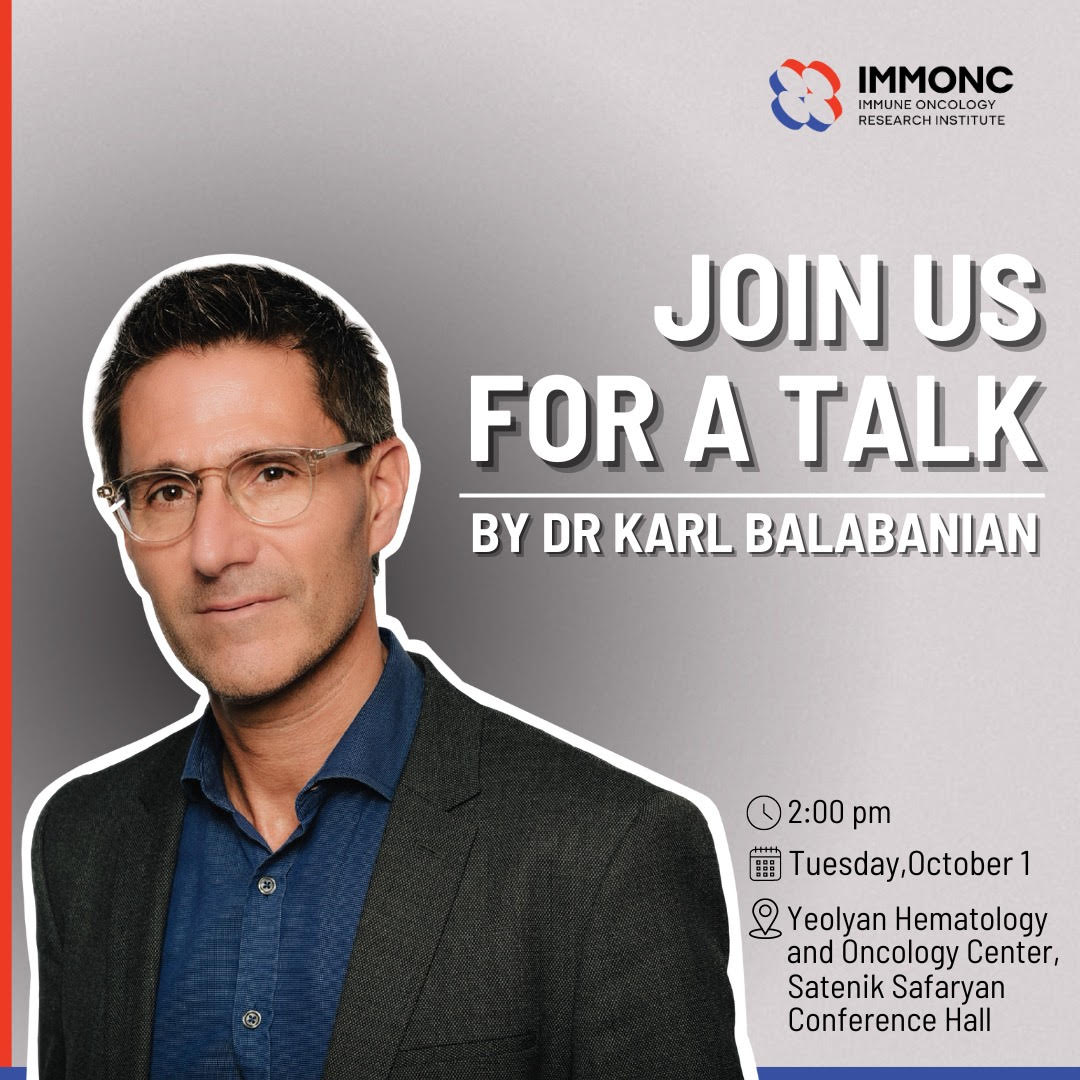
We are pleased to announce that Dr. Karl Balabanian, Research Director at INSERM and head of the “Chemokines, Lymphoid Niches, and Immunopathology” team at Saint-Louis Hospital and the INSERM U1160 unit associating INSERM and University Paris Cité, will be visiting Armenia this October, where he will meet the teams at the Immune Oncology Research Institute and Yeolyan Hematology and Oncology Center.
Dr. Balabanian is a distinguished immunologist with years of expertise in the genetic, molecular, and functional dynamics of chemokine-receptor interactions. By using bedside-to-bench approaches combining molecular and functional investigations on humans and pre-clinical mouse models, he contributed to seminal breakthroughs including the discovery of ACKR3/CXCR7 and the identification, molecular characterization and modeling of CXCR4 dysfunctions in rare immunodeficiencies, notably the WHIM Syndrome. Dr. Balabanian has co-authored more than 80 peer reviewed articles and has 5 patent applications.
During the meeting, he will give a presentation on his abstract titled 'CXCR4 signaling, a gatekeeper orchestrating the bone marrow ecosystem'.
The bone marrow (BM) is a complex organ co-harboring hematopoietic stem and differentiated effector cells. In 2019 I set up a new team at the Institut de Recherche Saint-Louis (IRSL, Université Paris Cité, INSERM U1160, Paris) to decipher mechanisms driving the fate of BM lymphoid cells at steady-state and during hematological disorders. Apart NK cells, our team focuses on two cell types: multipotent progenitors (MPP) and plasma cells (PC). Despite the importance of MPP and PC in health and disease, intrinsic and extrinsic mechanisms supporting their localization and fate in the BM are still elusive, although newly arising evidences suggest they share many features (Bonaud et al., Front Immunol. 2021). Signaling by the G protein-coupled receptor CXCR4 on MPP/PC in response to the chemokine CXCL12, produced notably by skeletal stromal/stem cells (SSC), is a key pathway through which MPP and PC communicate with their environment. This dialogue is disturbed in the WHIM Syndrome (WS), a rare immuno-hematological disorder caused by inherited heterozygous gain-of-CXCR4-function mutations affecting desensitization of the receptor and characterized by chronic lymphopenia and vaccine defect. As we reported using a WS preclinical mouse model (Balabanian et al., Blood 2012) and BM/blood samples from patients, this gain-of-CXCR4-function impacted lymphoid differentiation of MPP, particularly the MPP4 subset (Freitas et al., J Exp Med 2017; Rondeau et al., Science Signaling in press), trafficking and maturation of PC (Biajoux et al., Cell Reports 2016; Alouche et al., Blood 2021) as well as osteogenic fate of SSC (Anginot et al., Nature Communications 2023) within BM. These studies illustrate the philosophy of our lab, taking the understanding of the disease one step further, while investigating new cognitive aspects of the CXCL12/CXCR4 signaling axis. Our current goal is to determine using WS as a paradigm how CXCR4 signaling controls lymphoid cell fate in the BM. We hypothesize that enhanced CXCR4 signaling results in mislocalization of MPP/PC in BM, leading to aberrant external cues received that shape their metabolism and ultimately their fate likely as a consequence of an epigenetic rewiring. The talk will focus on our recent studies providing novel mechanistic insights into how CXCR4 signaling regulates the fate of MPP, PC and SSC.
Join us for a talk with Dr. Balabanian on Tuesday October 1, 2024, at 2:00 PM at the Satenik Safaryan Conference Hall, Yeolyan Hematology and Oncology Center, where he will share insights from his recent studies.
About IMMONC
Immune Oncology Research Institute (IMMONC) is dedicated to advancing research aimed at preventing, treating, and ultimately curing cancer while making these innovations accessible to those who need them. If you're interested in joining our team, please feel free to contact us at [email protected] or at +374-41 310-048